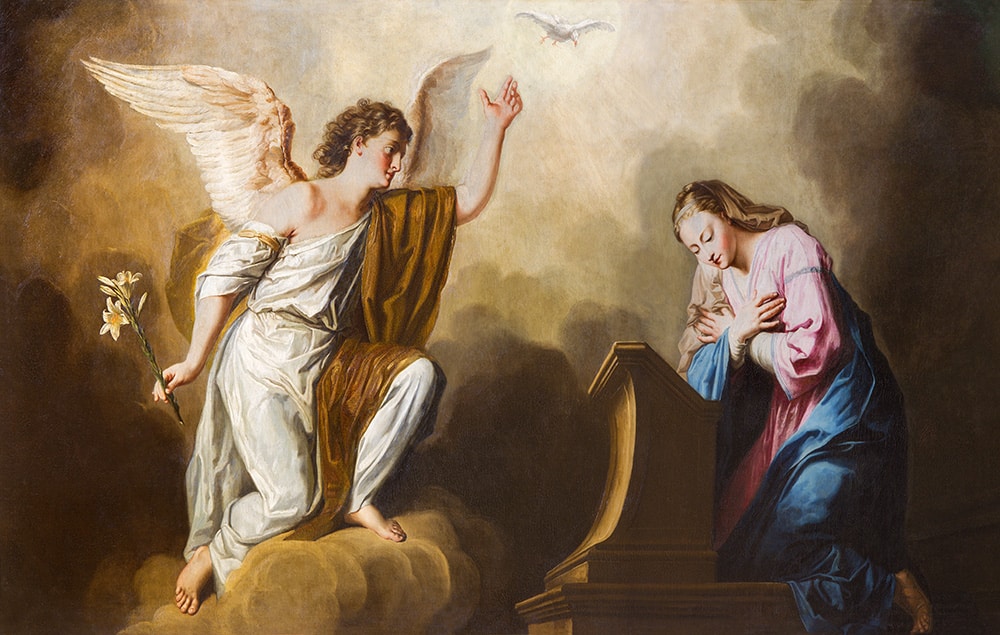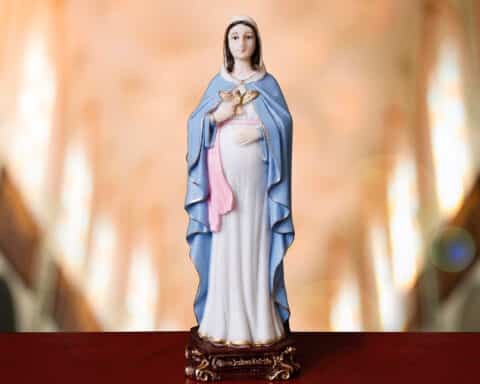Abraham is rightly revered as our father in faith. St. Paul refers to believers as “those who follow the faith of Abraham, who is the father of all of us” (Rom 4:16) and refers to “those who have faith who are children of Abraham” (Gal 3:7).
John the Baptist suggests the same when he warns the Pharisees and Sadducees, “And do not presume to say to yourselves, ‘We have Abraham as our father.’ For I tell you, God can raise up children to Abraham from these stones” (Mt 3:9). And Jesus likewise warns that “if you were Abraham’s children, you would be doing the works of Abraham” (Jn 8:39). What all of these have in common is that Abraham is viewed not just as faithful, but as the exemplar of faithfulness.
Cracks in Abraham’s faith
But there are cracks in Abraham’s faith, particularly at first. The first several times that God calls Abraham to do something, he obeys … kind of.
For instance, the first thing God asks of him is to “Go forth from your land, your relatives, and from your father’s house to a land that I will show you” (Gn 12:1). And Abraham, to his great credit, “went as the Lord directed him” (Gn 12:4).

This is one of the things that he’s praised for in the Book of Hebrews: “By faith Abraham obeyed when he was called to go out to a place that he was to receive as an inheritance; he went out, not knowing where he was to go” (Heb 11:8).
But Abraham doesn’t leave all of his kindred and his father’s house behind, for “Lot went with him” (Gn 12:4). Along the way, they take a detour to Egypt to avoid a famine. While there, Abraham insists that his wife, Sarah, pose as his sister for fear that if the Egyptians recognized her as his wife, “then they will kill me, but they will let you live” (Gn 12:12). Despite having been promised the Promised Land by God, Abraham is still acting as if it’s possible that God’s plans might be thwarted by lustful Egyptians.
What’s more, these cracks in Abraham’s faith prove painful to those around him. Abraham’s decision to bring Lot and his family along to the Promised Land results in the death of Lot’s wife, with Lot’s daughters nearly being raped and with Lot’s whole family barely escaping annihilating divine wrath (cf. Gn 14).
Likewise, when Abraham makes Sarah pretend to be his sister, “But the Lord struck Pharaoh and his household with severe plagues,” causing a frustrated Pharaoh to ask Abraham, “How could you do this to me! Why did you not tell me she was your wife? Why did you say, ‘She is my sister,’ so that I took her for my wife?” (Gn 12:18-19). Abraham says nothing in reply, and goes on to repeat this deception at Gerar, nearly killing the righteous King Abimelech in the process (cf. Gn 20).
Covenant
What Abraham struggled with was the all-too-familiar temptation to follow God on our terms. That is, Abraham isn’t running from God, as Jonah might; he’s just not completely trusting that God will fulfill the plan without a little extra help. And something is comforting in the fact that despite these imperfections, he is still revered as our father in faith.
But God nevertheless called Abraham to more than this, and this is what the covenant of circumcision was all about. God’s covenant to Abraham included the promise that Abraham’s descendants would be as innumerable as the stars (cf. Gn 15:5), but Abraham’s wife Sarah was (from a human perspective) beyond her childbearing years. And so once again, Abraham tried to fulfill God’s promise for him by taking matters into his own hands, fathering a child by Sarah’s maidservant Hagar (cf. Gn 16:1-16).
When God clarifies that it is through Sarah (not Hagar) that he will fulfill his promises, “Abraham fell face down and laughed” at the absurdity of God’s plan, and pointed God to Ishmael instead (Gn 17:17).
This is the context of the covenant of circumcision (cf. Gn 17:9-27). God is creating a physical reminder to Abraham and all of his male descendants not to trust in themselves, but to trust in God, instead. The physicality of the reminder is connected to Abraham’s indiscretion with Hagar in an obvious way, but there’s also a deeper point. Abraham is bold and faithful in following God, but he still needs to learn receptivity and docility, traits identified with femininity. As husband and father, Abraham must lead; as disciple, he must follow.
Excelling in faithfulness
For this reason, there is one figure in the Bible who excels even Abraham in her faithfulness: the Virgin Mary. When the angel Gabriel tells Mary that she’s going to bear the Messiah, she doesn’t run to her husband to try to make it happen on her terms, as Abraham might. Instead, she says, “How can this be, since I have no relations with a man?” (Lk 1:34). This is a total renunciation of “taking matters into her own hands.”
Mary is quick to act when action is called for. Immediately after this, she “set out and traveled to the hill country in haste” to attend to her cousin Elizabeth (Lk 1:39). But she’s also willing to wait on God, to be docile, and to receive.
Cardinal Joseph Ratzinger, in the “Letter to the Bishops of the Catholic Church on the Collaboration of Men and Women in the Church and In the World,” observed that “Mary, the chosen daughter of Zion, in her femininity, sums up and transfigures the condition of Israel/Bride waiting for the day of her salvation,” just as “the masculinity of the Son shows how Jesus assumes in his person all that the Old Testament symbolism had applied to the love of God for his people, described as the love of a bridegroom for his bride” (No. 10).
And St. John Paul II said in Mulieris Dignitatem that “through her response of faith Mary exercises her free will and thus fully shares with her personal and feminine ‘I’ in the event of the Incarnation” (No. 4). That is, all of the promises to “the Bride,” to Israel and the Church, are localized and made incarnate in the person, and the womb, of Mary.
What is characteristically masculine in Abraham needed further (painful) purification, so Abraham would trust in God rather than himself; what is characteristically feminine in Mary was the door between heaven and Earth, and the place where God’s promises to his people were fulfilled. And we see this receptivity in the soul of Mary as well. The Gospel for Jan. 1, the solemnity of the Mother of God, emphasizes how “Mary kept all these things, reflecting on them in her heart” (Lk 2:19).
God acts, we receive and respond
The point here is broader than a simple comparison between two Biblical figures. In his commentary on the Song of Solomon, Pope St. Gregory the Great says that the figure of the Bride represents both “the whole church in the collective sense” and “every soul in the particular sense.”
That is, the Bible’s masculine imagery for God goes hand-in-glove with the feminine imagery of the Church and the soul. The second reading for the feast of the Annunciation is St. Paul explaining how God chose us in Christ “before the foundation of the world, to be holy and without blemish before him,” and how “so that we might exist for the praise of his glory, we who first hoped in Christ” (Eph 1:4, 12). But Paul is merely describing in the technical language of predestination what is elsewhere described in figurative spousal language.
It is God who acts, and we who receive and respond. While the other religions of the world are men reaching out to God, and trying to discover the meaning of the mysteries of life, the religion revealed to Abraham is God reaching out to us.
And it’s for this reason that, “by her complete adherence to the Father’s will, to his Son’s redemptive work, and to every prompting of the Holy Spirit, the Virgin Mary is the Church’s model of faith and charity” (CCC 967), surpassing even Abraham himself.
Joe Heschmeyer blogs at shamelesspopery.com and is the author of “Pope Peter: Defending the Church’s Most Distinctive Doctrine in a Time of Crisis” (Catholic Answers Press, $16.95).





